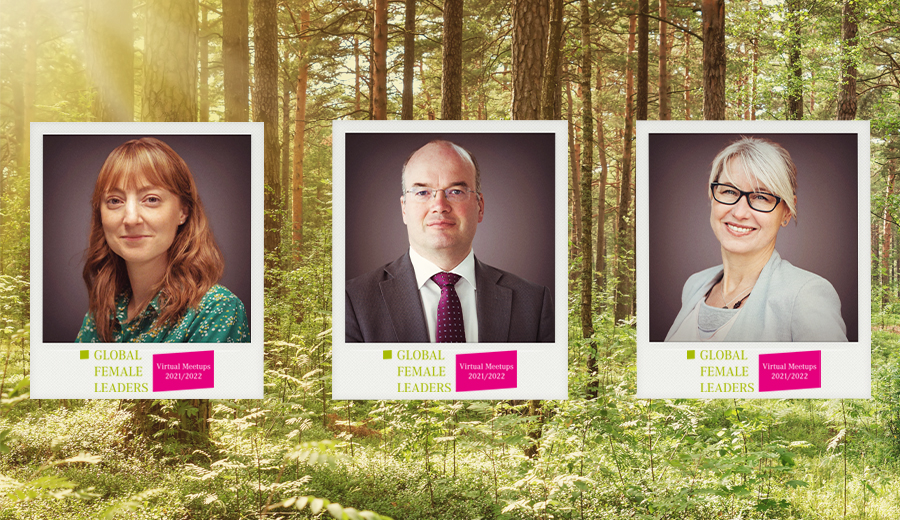
COP26 and what it means for business
In collaboration with Global Female Leaders summit media partner Bloomberg, represented by moderator and climate change journalist Jess Shankleman, this was a high point in our Global Female Leaders Virtual Meetups. Dr Emma Keller, head of sustainability at Nestlé, Dr Thomas Becker, VP sustainability and mobility strategy at BMW and Cecilia McAleavey, director of sustainable eating and public affairs at Oatly, spoke about the impact of climate change on their companies’ activities, and although their businesses are very different, their messages were not: across all industries, we have to get things done, we have to do them right, and we have to do it now.
Both Cecilia and Emma are from the food industry, which had been largely – and, in their opinion, disastrously – overlooked in the COP26 programme. The main focus of COP26 was fossil fuels, and after lengthy talks and a final verbal tussle on the plenary room floor, the Glasgow pact included a line in which 197 countries agreed to ‘phase out’ inefficient fossil-fuel subsidies and ‘phase down’ the use of unabated coal power, in a somewhat watered-down version of what had been hoped for. As Jess pointed out, there was much activity away from the main summit programme, a fact also commented on by the panellists who all spoke about the “side events” that on the one hand helped raise people’s awareness of the crucial importance of the summit but conversely, were also where behind-the-scenes discussions on very focused issues took place. As useful as zoom is, this is a beloved function of in-person events that we have all sorely missed during the pandemic lockdowns and endless online seminars and conferences!
There’s only enough space here for a brief summary of the fascinating discussion – take time out to watch the video here to unpack the full story!
WHICH ASPECTS OF COP26 WERE SIGNIFICANT FOR YOUR BUSINESS?
Emma Keller pointed out that Nestlé was participating in a COP summit for the first time as they had a credible, robust emission reduction roadmap towards net zero by 2050 and are positioned to advocate for and support a more ambitious approach by governments. With food and agriculture being responsible for a massive 30% of global emissions, there was a huge amount to be done, and Nestlé was ready to demonstrate their role, including measures such as “carbon insetting” and reforestation, as well as commitments to governments in many of the 187 countries they’re represented in around the world to assist them in reclaiming degraded land for sustainable crop production. Emma’s passion for genuine, committed change across Nestlé’s business activities – including their pension fund – was clear.
Thomas Becker indicated the wide range of issues that BMW has to deal with in its emissions-reduction programme: not only reducing emissions “at the tailpipe” but also the vastly complex issue of their supply-chain CO2 footprint, as they have literally thousands of suppliers in all regions of the world. Ramping up the share of secondary and renewable materials is key, as is offering electric-only brands such as Mini and Rolls Royce, but BMW cannot at this point state that all its new cars will be zero emission by 2035 as the charging infrastructure in even major cities across Europe is not yet in place. He agreed with Jess that setting a date by which that infrastructure must be in place could help but achieving zero-emission goals would require both supply-side regulation combined with demand-side incentive. Synthetic fuels could also be part of the solution.
Cecilia McAleavey of Oatly elaborated on the role of the food sector in greenhouse gas emissions, with half of those emissions coming from the meat and dairy industry. Although inspired by the side events in Glasgow, which she believed were a clear sign of the determination to act not just talk, she also spoke of a “broken food system”, insisting it be put at the top of the agenda at COP27 to advocate for a shift to a more sustainable, predominantly plant-based diet. She stressed the importance of individual empowerment – how informing people about the carbon footprint of food was key to enabling them to make more sustainable choices. Young people especially were making their voices heard on biodiversity and climate issues, and she pointed out that the school system – both on the curriculum side as well as nutritionally, in their kitchens – is key to driving change in dietary orientation, while acknowledging the complexity of the issues surrounding agriculture in the different hemispheres. She also remarked that with the global food system being so interlinked, individual actions could not be useful.
NEGATIVE POINTS AGREED ON:
- Methane reduction is critical. The International Energy Agency will reveal a database in February next year showing which countries have the highest methane emissions – watch this space!
- Global deforestation must stop. The commitment made at COP26 is that it must cease by 2030, and this time the agreement is backed by finance – but this needs to be mobilized quickly to ensure that all countries stick to their commitment.
- Previously allocated financial support has not been distributed. The annual $100Bn climate finance commitment from rich countries to support poorer countries must begin to flow for countries to meet their climate targets.
POSITIVE POINTS AGREED ON:
- Collaboration is key. The word came up repeatedly, as it was acknowledged that there cannot be individual responsibility where complex supply chains are concerned.
- Clearer standards for offsets and carbon credits needed. Defining and agreeing on these standards is essential, especially as gold standard, high-quality offsets could become part of a “green rush”. But carbon offsetting and credits were generally viewed as a last resort.
- Momentum must be maintained. The next 5-10 years will be critical, and larger organisations in particular must “go further and faster”.
Comments
No Comments

